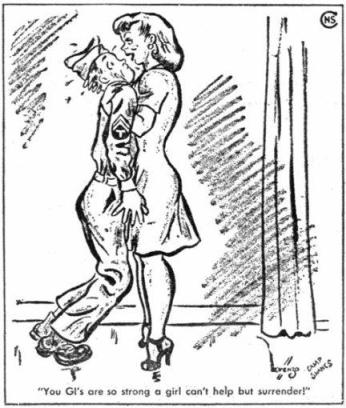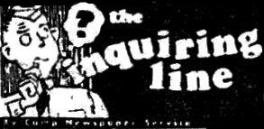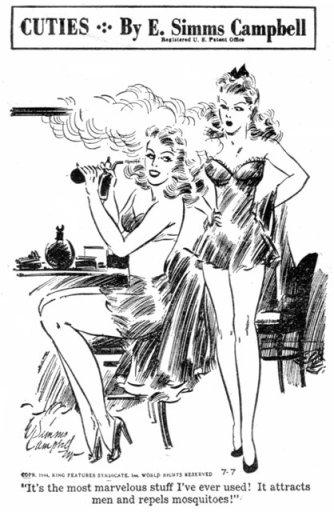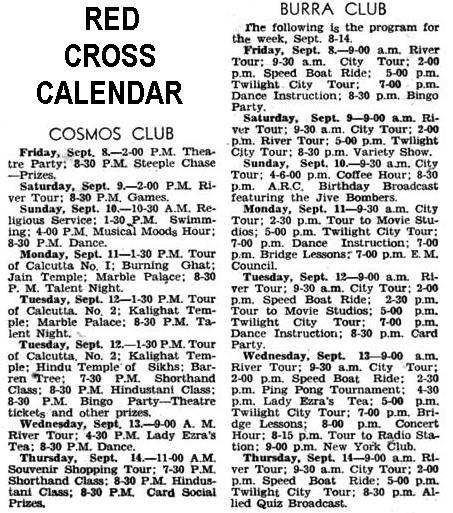
VOL. I. No. 27 - SEPTEMBER 8, 1944 FOR U.S. ARMED FORCES PRECENSORED FOR MAILING
The Monsoon As Well As The Japs
As recently as two years ago it was believed that the operation of an air force in India and Burma during the monsoon season was an impossible undertaking. For approximately a three month period monsoon weather creates worse flying conditions than are found anywhere else in the world. In addition, excessive rainfall multiplies problems of supply and maintenance.
In spite of these difficulties however, USAAF and RAF fighter, bomber and troop carrier units of Maj. Gen. George E. Stratemeyer's Eastern Air Command conducted full-scale operations throughout the entire 1944 monsoon period.
The photographs below illustrate various aspects of EAC's monsoon operations.
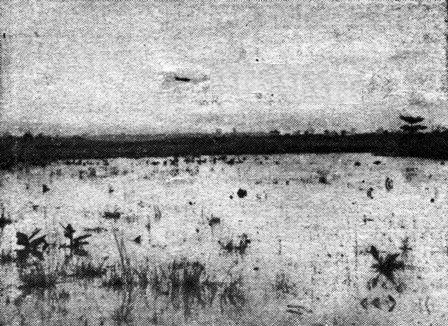 THIS WAS AN AIRSTRIP
THIS WAS AN AIRSTRIPA solitary EAC transport wings its way over an airstrip which had to be abandoned during the monsoon season. |
 UNWELCOME LAKE
UNWELCOME LAKEThe monsoon elements transformed this landing strip into a veritable lake. |
 TENT AREA
TENT AREAMonsoon moisture didn't confine itself to landing strips. Here's a typical tent area near strip where water forced troops to evacuate to less liquid if not dry surroundings. |
 WHIRLING PATTERN
WHIRLING PATTERNA transport taking off for Myitkyina from a base in Assam during a driving monsoon shower. Note the circles of moisture outlining the arc of the propeller blades. |
INDUSTRIALIZED CHINA RUMORED NELSON’S GOAL
WASHINGTON - The Chairman of the War Production Board, Donald Nelson, now on a secret White House mission to China is believed to be laying the groundwork for post-war industrialization of China which will strip Japan of foreign markets and provide the United States with huge orders for heavy machinery. President Roosevelt said that he was sending Nelson as his personal emissary to Marshal Chiang Kai-shek to discuss "economic problems" but the nature of it was not disclosed. However, the study of Nelson's views on world economic problems indicates that he will take up the matter of modernizing and expanding China's small industry. Nelson in a speech several months ago expounded the theory that the United States must help others to build up healthy industries to avoid serious global post-war depression. He said, "It is becoming ever clearer that the best method by which we can promote sustained healthy expansion of foreign trade is to aid undeveloped regions to build sound industries of their own. We have learned that when we help other peoples to build healthy industries we make them better customers for American." It is accepted here that industrialized China with labor as cheap as Japan's could move in on Japan's foreign markets and simultaneously raise China's standard of living.
WD OUTLINES OFFICIAL DEMOBILIZATION PLAN
WASHINGTON (ANS) - The War Department made public Wednesday a demobilization and readjustment program which will give soldiers with the longest overseas service and those with dependent children priority on return to civilian life.
When Germany is defeated, partial demobilization from a peak strength of 7,700,000 will be on an individual rather than unit basis, and will be set up on a point schedule giving credit for total months in the Army, totals months overseas, decorations indicating combat service and dependent children up to a miaximum of three, the War Department said.
The majority of the men will have to stay on the job until Japan is crushed, and some troops now in the European Theater will be sent directly to the Pacific as part of the huge task of focusing American strength on Japan. The system of discharges, however, will enable the release of some men now serving in the Pacific as well as in Europe and their replacement by men from Europe and the United States. The War DEpartment cautioned that because of shipping for transferring our armed might to the Pacific, it may be some months before the fortunate ones get home.
Additionally the War Department said that regardless of a man's priority standing certain types of personnel will not be designated "surplus" as long as the war with Japan continues. Officers will be released as they can be spared with military necessity determining which are non-essential.
|
Chinese Casualties Total 2,810,220
CHUNGKING Sept. 6. - The Chinese High Command announced that the total of Chinese casualties up to the end of June was 2,810,220 killed and wounded. Japanese casualties up to the end of May this year totalled 2,144,000 killed and wounded. The figure does not include Japanese losses in the Hunan campaign where the Japanese lost 27,000 in the Hongyang siege alone. |
|
Chinese Forces Attack Lungling
CHUNGKING Sept. 6. - The Chinese cleared the main ridge of Sungshan, just qwest of the Salween River, according to today's Chinese communique. The Chinese main body has passed Sungshan and is now attacking Lungling. Once Sungshan is cleared of Japanese troops, the Chinese will have complete control of the Burma Road from the Salween River to Lungling. The Chinese have made a slight advance inside Tengchung, the key town north of the Burma Road. |
|
14th ADVANCES ON TIDDIM ROAD
KANDY Sept. 7. - Following is today's S.E.A.C. communique: Chin Hills: After a foure mile advance against slight resistance 14th Army troops on the Tiddim Road yesterday made contact with a strong force from the enemy rear guard. Chindwin Front: The search continues for stragglers from the Japanese who retreated across the Upper Chindwin. Another dead and much abandoned transport have been found. North Burma: Patrol activity continues. Air: There was increased activity by U.S.A.A.F. bombers and R.A.F. and I.A.F. fighters and fighter-bombers of the Third Tactical Air Force, Eastern Air Command, against enemy positions, motor transport and rivercraft in the Tiddim Road and Upper Chindwin areas. R.A.F and I.A.F. fighters were also active over the Arakan and Kaladan areas. Long range R.A.F. fighters strafed railway stock and rivercraft in central and southern Burma. In a night attack R.A.F. heavy bombers of the Strategic Air Force bombed railway targets forty miles west of Bangkok. No Allied aircraft are missing |
|
Uncle Joe, Nelson, Hurley In China CHUNGKING Sept. 6. - General Joseph Stilwell arrived in Chungking today (Wednesday) by plane. The chairman of the War Production Board, Mr. Donald Nelson and President Roosevelt's personal representative in Middle East and Far East, Brig. Gen. Patrick Hurley, who arrived on the same plane are expected to call on Generalissimo Chiang Kai-shek tomorrow. It is generally believed that Mr. Nelson and Gen. Hurley will discuss with the Chinese authorities the question of how to increase the flow of supplies into China over the Burma Road when the road is reopened. The will also study China's economic needs as well as the development of her industries after the war. |
|
Officially Opened
A brand new Post Exchange with more than 110 feet of counter space and a vast variety of new merchandise was officially opened at Headquarters building in Calcutta yesterday, Thursday, Sept. 7, by Brig. Gen. G. X. Cheves.
The new P.X., which will be the main exchange in this area, is expected to fill the tremendous increase in demand for American merchandise as well as numerous Indian products which are being placed on sale for the first time.
A large and complete "Curio Counter" will feature products of India, such as brassware, gold and silver jewelry, fancy table covers, women's purses and numerous other gift items. One well received addition is a "juke box," one of the few in India.
Doughnuts, coffee and hamburgers, as well as cold drinks, will be sold during the day. A staff of four enlisted men and nine civilian employees will man the counters. Arrangements for the opening were made by Lt. W. B. O'Hanley, Exchange Officer, and Sgt. Frank H. Walls, Chief Clerk. Sgt. Claude Merrell has been appointed Supervisor.
AIR FORCE BASE HAS AMERICAN ‘GUNGA DIN’
AT TENTH USAF BASE IN INDIA - "Gunga Din" of Rudyard Kipling fame, comes to true life here in this American base.
He's, as the British poet put it, "Now in Injas sunny clime," but he's not "Aservin' 'er majesty the queen." Rather he's in the service of Uncle Sam's air force as Staff Sergeant.
This American counterpart of Gunga Din is partly Indian, but his Indian blood is not that found in this part of the world. He hails from a town named Agra, in Oklahoma, and his folks are the descendants of a Seminole chief.
It all started this way. Before Gun Dean (a slight variation from that of Kipling's fame) was born, his pop served in World War I. He promised a buddy, a pure blood American Indian, that he would name his male offspring Gunga, after Kipling's beautiful poem. So when the child was born 24 years ago he became Gunga Din personified.
Dean at this base may be seen occasionally, as Kipling had it, "squattin' on the coals" or mimicing other familiar Indian gestures but in this prohibitionists haven - again quoting Kipling - You don't find him "givin' drink to poor damned souls."
PAUL FENG, Central News Agency of China.
|
At a surprise ceremony which started out as the traditional evening retreat, Capt. William A. Bailey, Aledo, Illinois, was presented with seven medals Sunday by Lt. Col. James A. Anderson, commanding officer of a local Photo Reconnaissance Squadron.
The seven medals, which included the Air Medal, three Oak Leaf Cluster to the Air Medal, the Distinguished Flying Cross, and two Oak Leaf Clusters to the Distinguished Flying Cross, were awarded for 70 missions undertaken by Capt. Bailey during the period from February, 1943 to September, 1943, from Henderson Field, Guadalcanal.
The Air Medal was given for, the citation reads in part, "sustained aerial photographic flights over enemy territory . . . of a highly hazardous nature . . . alone and in unarmed aircraft with attack at any time probable and unexpected. The services of this individual, by his courage and determination to succeed despite all obstacles, reflect high credit on the Army Air Forces."
ASC Planner Gets Legion Of Merit
HQS., CBI ASC, INDIA - It was in a lonely barracks at Wright Field, Ohio, that five Army officers pored for months of long nights over plans, charts and statistics. They were confronted with a vital problem of organization for the USAAF, and out of their efforts blossomed the Air Service Command - an organization that has grown to such prodigious proportions today that the sun never sets upon its global operations.
One of those five officers was Col. John C. Gordon, a West Pointer of the Class of '31, and it was with considerable elation and ceremony that Maj. Gen. T. J. Hanley, Jr., commanding the CBI Air Service Command, proudly pinned the Legion of Merit on the Colonel in accordance with directions from the War Department in Washington.
A native of Hattiesburg, Miss., Col. Gordon has been an active pilot-flying officer during his entire Army career. He supplemented his flight training at Randolph Field with attack schooling at Kelly Field and tactical schooling at Maxwell Field. Currently, he is serving as chief of the Plans & Operations Division here.
His wife, Durinoa, and son, Martin, are residing in San Antonio, Texas.

|
CBI Radio Productions Featured
Over Coast To Coast US Network
Although the CBI Theater is the most remote of America's war zones, it is the only one represented in the U.S. by a weekly radio program. This show, "Yanks in the Orient," is produced by an Army transcription unit known as the CBI Radio Team and is flown regularly to Uncle Sugar in the form of recordings for weekly nationwaide release over the Blue Network.
Last week the team was in Calcutta with Lt. Col. Paul L. Jones, Theater Public Relations Officer, to record the scene when a Port battalion hustled the freight off a Liberty Ship in the world record times of 46 hours, 4 minutes. The creaking of cranes and winches, the yells of the coolies, the music of the band which saluted the feat and the tired voices of the GI's who did the work were all included in the recorded broadcast, which will give millions of Stateside listeners an idea of how this mission was accomplished.
Not on hand when the actual last load went over the side, the CBI Radio Team recreated the event. With the permission of the Base Section boss, Brig. Gen. G. X. Cheves, the Army broadcasters took over a section of the King George Docks. A staggering list of props was called for by the producer, Lt. Finis Farr of New York City, who is in charge of the Radio Team in the field. It included such items as "One ship, Liberty; one crane, floating." Members of the Port Battalion gave their time to contribute interviews and the boys in the Base Section Band stood by for an entire morning to furnish the music.
Using several thousand tons of shipping for a sound effect is not a novelty to Lt. Farr. He said, "This war is probably making it impossible for me ever to work in a studio again. In China I used 40,000 actors at one time at one of the B-29 airfields. They were the Chinese men, women and children who built the strip. This sort of thing tends to make a man drunk with power."
"The CBI Radio Team was an idea cooked up last year by Major Rankin Roberts, China PRO, and Col. Jones,
|
"The team was formed and got underway with a few dry runs. Things picked up in the Ledo area, Burma and China and by April of this year, the Blue Network launched the first 13-week series. We're now working on an additional 26 weeks, to begin the last week in September, also ove the Blue."
"Beside the network production, the team also turned out some 200 GI interview recordings for release on local stations. Many of these were heard but unfortunately, some were held up in Washington red tape trouble. For the sake of the GI's we hope these also will be released in the near future."
"Our greatest difficulties came from the lack of reliable sources of steady power. Sometimes a generator will slack off in the middle of a recording and the playback then gives you a weird wailing sound. The first equipment we used was well made but not portable in any very practical sense. It weighed hundreds of pounds and we had to carry it. Now we have an excellent gadget called a wire recorder which can be carried with some facility and is considerably more flexible for use in the field."
"There was never any trouble in finding material. There is great stuff available in every part of India, Burma and China where GI's are operating. At one newly-constructed Chinese airfield, the farmers who built the 'drome wanted to know why the Americans wanted such a large place for such a small things as an airplane. Up to that time they had seen only an occasional P-38 and P-40. When the first B-29 came in they got the idea right wawy."
"We've had a chance to record the building of the Ledo Road, the work of the Y-Force in Yunnan, the operations of the troop carrier squadrons, the 10th and 14th Air Forces, the activities around Myitkyina and work of the GI's at advanced China bases. At one base we had the test pilot of a rebuilt P-40 buzz the hangar where we were recording. He threw himself so whole-heartedly into his part that he carried away a clutch of powerlines and a Signal Corps telephone pole. That's co-operation."
"In apportioning our time we've divided it equally between China, Burma and India. In fact, a highly interesting series could be made without ever leaving the Indian U.S. installations. The boys even had a crack at the Taj Mahal, but finally gave up. We are sound recorders and the Taj is probably the world's quietest tomb."
"The recording of the Port Battalion here ought to hit the air in Uncle Sugar some time in October. It will be part of the forthcoming new series, still titles "Yanks In The Orient," in which we hope to report all phases of the increasingly vital activities of CBI toward the destruction of Japan. We haven't as yet put any 'hokum' into our recordings but we have tried to do justice to our subject. You might call it a big one."
Major Gen. LeMay XX Bomber Leader
HEADQUARTERS, XX BOMBER COMMAND, INDIA - Maj. Gen. Curtis Emerson LeMay, who for two years played a direct and important part in the strategic bombing of Hitler's Fortress Europe, has arrived at this headquarters to direct the XX Bomber Command in similar operations against the Japanese empire.
The new commanding general of the Superfortress organizations, which already has attacked the Japanese mainland several times, was commanding a heavy bombardment division operating from the United Kingdom when he was recently recalled to the United States and given his present assignment.
He personally led many spectacular missions over Europe and holds the Distinguished Service Cross, the second highest United States military decoration, for leadership of the Flying Fortress attack upon the Messerschmitt plant at Regensburg, Germany, in August 1943.
Born in Columbus, Ohio, 15th November 1906, General LeMay was graduated from Ohio State University with a degree in civil engineering. After his graduation he took Army flying training at Brooks and Kelly Fileds, Texas, receiving a pilot's wings and a reserve commission a short time later at Selfridge Field, Mich., and took a special navigation course under Harold Gatty, who had just completed a round-the-world flight.
Transferring to bombardment craft in 1939 at Langley Field, Va., he flew as a navigator that year on a Flying Fortress goodwill tour of South America, the first long flight of a United States Army air formation beyond continental limits of the country. For this operation he received the Brazilian Order of the Southern Cross.
During the summer of 1941 he flew as co-pilot of a Liberator in an aerial survey of airports from South America to Iraq, blazing the trail for a supply route to Russia and the Middle East. For this 26,000-mile journey he received the Distinguished Flying Cross.
Early in 1942 he formed a heavy bombardment group which he took to Europe. He led the group's first mission, to Wilhelmshaven, and continued active leadership of operation flying as pilot, co-pilot, navigator and once as top turret gunner.
Sturdy, black-haired, blue-eyed, General LeMay is a cautious, determined flyer with a logical analytical mind of exacting standards. His tastes are simple and he works at all hours. He finds much relaxation in "GI" movies and plays careful poker. He is married and has a five-year-old daughter. His family resides at lakewood, Ohio.
|
Depot Adds Tasty Dish To GI Diet
A large shipment of fresh, smoked ham was sent this week by General Depot No. 2 to various Army installations including an Air Depot and a Quartermaster Truck Co.
Lt. Thomas Gibson, Jr., Substinence Officer, said that the Depot hopes to make the supply of fresh ham a regular feature of it's daily food issue. "We expect to supply ham to local mess halls at a quantity sufficient for at least one serving per week in the future," he said.
Explaining this latest addition to soldier's menus Lt. Gibson said that the initial issue of ham is part of a long term plan by Col. A. M. O'Dell, commanding officer of the Depot, to provide as many fresh foods and "home grown" commodities as possible. In the past few months fresh eggs, fruits, vegetables including sweet corn, and ice cream have been added, it was pointed out. "It is our belief that soldiers in India are among the best fed American troops in any theater," Gibson stated.
Units which did not receive the tasty ham in the initial issued will not be overlooked, it was pointed out, and they will receive their regular quota at a later date.
The ham was grown by the Veternarian section of the General Depot which is under the command of Major M. C. Coop. "These hogs were all fed on the scraps from local mess halls." Major Coop said. The curing and smoking of the meat, an intricate process in itself, is being done by the General Depot.
No Driver Problem For Engineers Now
When the Transportation Section arrived in India some time ago they found that the ample T/O of a local Engineering District provided would be far from sufficient to meet the calls for drivers which their work demanded.
The solution to this problem became evident. It would be necessary to train Indians as drivers. The problem was to teach the men who had never driven anything but an ox cart, in some cases, to handle a big GMC. In one particular unit, three GI drivers, a non-driving interpreter, and one Indian who could drive fairly well received the first experimental class of seven Indians. Three weeks later the three soldiers took a day off, and five Indians received U.S. Army driver's permits. A test method was now ready to be applied on a large scale.
Upon reporting to the school, the new driver is first taught the names of the different parts of the truck. Some preventive maintenance, such as tire pressure and cleaning air vents, is taught at this time also. The gear shift is the next step, then double clutching and how to steer the truck down the road. Constant reviewing is necessary so that students do not forget everything they have learned.
Since most of the new men have had little or no experience with trucks, some operations which to the average GI might seem simple are really very difficult to learn, and equally difficult to teach. It is quite obvious to anyone what whill happen if the tire pressure is low, but an item such as the use of fifth gear must be completely ignored, because an explanation would take too long and probably only confuse the student.
Officers in charge of the school have pointed out that about 75 percent of the men who start are able to complete the course in 10 days. According to a spokesman of the Transportation Section "the work that the Indian drivers of this organization have done, and the care that they have taken of their trucks has been very good."
It was also stated that in the entire period during which Indian drivers have been employed only three accidents have been in the "over $25 class" and only one of these was traceable to negligence on the part of the driver. "The pride which they take in their traucks and in their driving might well be an example to all," said the spokesman.
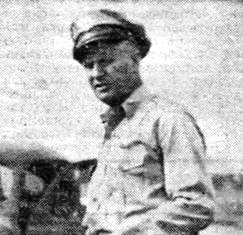
|
ATC BASE, INDIA - Brig. Gen. William H. Tunner, former commanding general of the Ferrying Division of the Air Transport Command, has assumed command of the India-China Division, it was announced today.
General Tunner succeeds Brig. Gen. Thomas O. Hardin, who has left to carry out some important but, as yet, undisclosed assignment, according to Division headquarters.
A native of Roselle, N.J., Gen. Tunner was graduated from the U.S. Military Academy at West Point in 1928 and commissioned a second lieutenant, field artillery. Since that time the bulk of his Army career has been devoted to the aviation branch of service.
Gen. Tunner's concentration on aviation began less than a year after graduation from West Point when he was selected to undergo officer flight training at Brooks Field, Tex., and Kelly Field, Tex., where he specialized in bombardment aviation.
His first assignment was at Rockwell Field, Coronado, Calif., as engineering officer of the 11th Bombardment Squadron. He later served as supply officer and post personnel adjutant with the same outfit. In 1931 he was assigned as flying instructor at March Field, Calif. Later the same year he was transferred to the new flight school at Randolph Field, Tex., when all primarily flying activities were concentrated there.
From 1935 to 1937 Gen. Tunner served as adjutant and supply officer with the 7th Observation Squadron at France Field, Panama Canal Department. He later saw duty as operations officer there until his transfer to Fort Benning, Ga., where he was operations officer of the 16th Observation Squadron until December, 1939, with several additional duties.
From that time until 1941 he worked as an instructor with the Organized Reserves of the Fourth Corps Area at Memphis, Tenn. As a colonel, he was one of the first officers transferredc to Washington in June, 1941, for duty with the Ferrying Command, predecessor of the Air Transport Command. He was commanding officer of the Ferrying Command's Domestic Wing until its reorganization as the Ferrying Division of the ATC. In his capacity of commander of this division, he was elevated to the rank of Brigadier General on July 4, 1943.
Under the general's command, the ferrying organization grew from one of 150 pilots to many thousand - with total personnel of more than 40,000 men and women engaged in the various functions requisite to flying planes and cargo safely to destinations where they are most vitally needed.
Just before departure from the United States, Gen. Tunner was awarded the Distinguished Service Medal in recognition of development of the Ferrying Division. He already was entitled to wear the Air Medal for pioneering the ATC's ferrying route across the Azores.
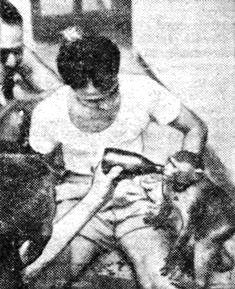
|
|
Editor, Command Post, Headquarters, Base Section No. 2
Dear Editor:
In your Aug. 25th issue I noticed a picture of a monkey named "Major," the official mascaot of a 10th Air Force squadron.
I am enclosing a snapshot of a strictly GI mascot named "Jackson," who is a real hep-cat.
Several of us boys stayed at a transient camp awaiting further orders some time ago, and in the meantime we played cards, ate plenty and took things easy. Every moring, noon and night this monkey, along with some of his friends, came down for candy. One day one of the fellows was sitting on the porch of the Basha drinking a bottle of beer when along came Jackson and began tugging on his arm for a drink. This guy laughed and said, "I think I'll give the little fellow a shot." A few minutes later, Jackson had finished a complete bottle of beer and had quite a glow on. From then on, Jackson had won a place for himself in our outfit.
Jackson is now our official mascot, and we think he is the most "GI" mascot any unit has ever had.
Sgt. Louis Sherman
Third Tactical AF Changes Command
Air Marshal W. A. Coryton, the man who taught the present King of England to fly, has succeeded Air Marshal John Baldwin as commander of the Third Tactical Air Force, it was announced this week.
Air Marshal Coryton comes to India from the Air Ministry, where he was Assistant Chief of the Air Staff (Operations). This will be his second tour of duty in India. He spent four years on the Northwest Frontier from 1920 to 1924, and for his work there was awarded the D.F.C. in 1922.
Most of his service in the last war was spent in the Rifle Brigade, into which he was commissioned in August 1914. When the R.F.C. appealed for pilots in 1917, he began his flying career.
Soon after the war - in 1919 - King George VI took up flying. The Air Ministry chose Coryton as his instructor, and the wings, now worn by His Majesty as Marshal of the Royal Air Force were gained as the result of his tuition. For this service to the Royal Family, Air Marshal Coryton was awarded the <.V.O.
The new Air Commander has held appointments in the Intelligence Directorate, Air Ministry, and the Operations Staff, Coastal Command. He has been Director of Overseas Operations, Air Ministry Officer Commanding No. 5 Group, Bomber Command, and Senior Air Staff Officer, Middle East. He was made a C.B. in 1941.
The Air Marshal, who is 49, was educated at Eton and Cambridge. He is a yachtsman and a good shot.
|
New Switchboard For Base Two Hq. A new six-position switchboard is the latest addition to easing the communication problem in and out of Headquarters Building in Calcutta. The new board will replace a three position board which has been heavily overladen with traffic. The board is being installed by Lt. Adrian bardes, of Staten Island, N.Y., Wire Officer, and Lt. James L. Manning, of Danville, Illinois, who is in charge of cable installation. The new board, which is of the most modern design, will be capable of handling at least twice as much telephone traffic as the old board. Construction and wire work is completed by S/Sgt. John Swish, Fulton, N.Y.; Sgt. Paul Wagner, Atlantic City, N.J.; Sgt. Edgar Alden, Raleigh, N.C.; Corp. Ernest Willaimson, Jersey City, N.J. and Corp. Herbert Swanson, Woodbridge, N.J. |
|
Marshall Praises CBI Supply Record
General George C. Marshall, Chief of Staff, had high praise this week for "the outstanding job in matters of transportation, despite the many difficulties not normally encountered in other theaters" which has been done by the Services of Supply in CBI. General Marshall expressed his satisfaction with the supply situation in a letter to the Theater Commander, General Stilwell, and said he hoped his deep feeling of appreciation would be passed along to every man responsible. General Marshall praised troops who have been engaged in the supply job and who have in recent months maintained supply levels at a high point. He said that Indian ports have been rated high by the Army Service Forces in handling vital war material. In a letter to Maj. Gen. W. E. R. Covell, Commanding General of SOS in CBI, General Stilwell added his praise to that of General Marshall's and asked that those responsible for this fine job be given a "pat on the back." Recently it has been announced that the U.S. Army-operated Bengal and Assam railway has increased its tonnage figures more than 50 percent. Ports, including the port of Calcutta, are now handling more traffic, unloading more cargoes, and pushing supplies on to forward areas faster than ever before. |
|
A. You may NOT use the Federal ballot. Paragraph 2A, WD 302, issued 17 July 1944 states that the Federal ballot may NOT be furnished to citizens of the 20 states that now authorize its use who are stationed inside the U.S.
Q. My brother, who is only 17, just enlisted in the Army by falsifying his age. How can I get him out?
A. Because he is over 16, your brother cannot be discharged for minority until one of his parents or his guardian applies for the discharge.
|
|
|
(Ed. Note: Sgt. Smith Dawless, a peacetime resident of Los Angeles, who spent time carving the Ledo Road out of the face of Assam, recently had one of his poems, "Conversation Piece" published by the New York World Telegram. So clearly does that poem describe the life on The Road that the editors of Army Times have called it the best soldier verse of World War II.) |
| (Editors Note: Hey soldier, if you have trouble trying to think up things to put in your letters back home, the letter printed below is intended to help you. Merely clip it out, sign your own name at the bottom, and send it home. Or, we don't even mind your "lifting" a paragraph or two. It's all yours!) |

For the past several years now, Americans have considered their country the fashion center of the world and rightly so. American style and fancy, through the medium of Hollywood, have really set the pace in nearly every corner of the globe. But I wonder how many of us ever stopped to realize that may of our fashions have been pracyiced by other peoples as a regular custom for many years.
In New York this summer, for example, that lates thing in women's jewelry are the so-called "slave bracelets." These solid gold and silver bands are being revived on the fashion marts. Many of us will remember that they were tremendously popular several years ago. They are nothing new for the laboring classes in India, where the women have been wearing them around their ankles and wrists for years.
The custom among the working classes is to put all of the family savings into those baubles, as they feel that the best method of safekeeping is to have them made into these attarctive solid silver bracelets. When things really get tough, the head of the family simply takes one of the silver bands from his wife's arm or ankle and sells it for its weight, as they are always pure silver.
One of the best contributions to soldier morale, Mom, has been the addition of an Army radio station here in Calcutta. The station, which recently upped it's power to 1000 watts, is now heard clearly all over the surrounding area. It is no exaggeration to say that practically everyone in Calcutta, military and civilians alike, listen to the station, as it provides the very finest "canned" American programs. There are naturally no commercials read between the entertainment features, and I sometimes think that the fellows wouldn't mind if, when the big networks are making up the recordings for shipment overseas, they would leave the sales talks in, it would make it seem more natural.
The programs are called "Command Performance" and people like Bing Crosby, Bob Hope, Kay Kyser and Richard Crooks are everynight performers. Not only do we hear these recorded programs however, but nearly every camp or cantonment in the Base Section has some musical or dramatic talent. Some finer quartets and dramatic artists, made up of local talent have already been heard. British troops are encouraged to contribute to the broadcasts and much fine talent has been unearthed among them also. The staff of the station, which is call VU2ZU, are experienced radio men, and present the programs in the best American style.
A prize example of the type of thing that has made it possible for Henry Kaiser, Andrew Jackson Higgins, Henry Ford and a host of other production experts to make the American production program the greatest in the world, was seen on a small scale here last week at the docks. A Battalion of Yank soldiers unloaded a Liberty ship with 4,600 tons of cargo in less than 47 hours. Ordinarily it used to take anywhere from 9 to 20 days to unload these ships.
The boys took a chance, hoping to set a new world's record for unloading a ship of this type, and they did just that. It was a thrilling sight to see the Base Section band swing out with the "Notre Dame Victory March" as the last big box was swung off the ship in record time. The ship's fog horn let loose a terrific blast in tribute to the record-smashing Port Battalion. Wherever American troops go this spirit of competition, this will to do something never before tried, something spectacular, follows not far behind. After the hard work was all over the fellows were plenty tired out, but they were happy because they knew they had done the job, and had even beat the time which they had allowed themselves.
Well the month of September will see the annual arrival of one of America's finest institutions, the County and State Fair. Doubtless there won't be as many people at the fair this year due to the large number of farmers who are in the Army, and the restrictions on traveling, etc., but from all reports it will be one of the most bountiful years in American history.
Over here we hear reports of record bumper crops in the farm states which will dwarf anything ever seen in other years. It is good to know that they haven't called the fairs off even if there is a war, because the fellows like to have things go on pretty much the same when they are away from home. They like to know that the old festive spirit will still carry on while they are gone and be waiting for them when they return.


|

|
VU2ZU Officially Goes On Air As 1000-Watter
After a series of heartbreaking delays, the Armed Forces Radio Station VU2ZU officially went on the air as a 1000-watt station Thursday, September 7, when Brig. Gen. G. X. Cheves, commanding general, Base Section 2, threw the switch on the new transmitter.
Even as the general turned on the power that would propel the voice of VU2ZU to all installations in the China-Burma-India Theater, plans were underway to increase the broadcasting facilities and add new and improved programs to bring to a realization the oft-expressed desire of the general that the Commandtown station be made "the finest in the CBI Theater."
M/Sgt. A. VanMitchell, Wilkes Barre, Pa., station director, made the first move in this direction when he announced yesterday that the daily broadcast schedule has been increased from nine hours to 11½ hours. The new addition is a morning Variety program from 6:30 A.M. to 9:00 A.M. The station then goes off the air until 2:00 P.M., when it resumes broadcasting until 11:00 P.M.
The work of installing the new transmitter has been rushed by the engineering staff, composed of Sgt. James Koehler, Long Beach, Cal., S/Sgt. Wilfred Lierheimer, Sea Cliff, L.I., and Corp. Leo Pfrang, Newark, N.J., since it arrived three weeks ago, in an effort to enable more listeners to enjoy the station's programs as quickly as possible. Technical surveys will be conducted by the staff to determine the coverage and reception of the station, and every effort will be made to build up reception in areas where there is interference caused by atmospheric conditions.
In conjunction with the opening use of the new voltage, VanMitchell said yesterday: "We're going to attempt to give the listening men in CBI the finest daily schedule of broadcasting it is possible to produce." VanMitchell added that special emphasis will be placed on providing listeners of the station with the fastest, most complete and most comprehensive newscasts possible.
Working with VanMitchell on the staff are Sgt. Edward Belford, New York City, program and dramatics; Sgt. Jack Rollins, New York City. Pvt. Al Epting, New York City, musical librarian and Pvt. Michael Switzer, Trenton, N.J., news and promotion. All four also work as staff announcers and as newscasters.
|
Big Dance Next Week
Now that the excitement of the record unloading job done by the men at Camp T last week has abated, activities at the Red Cross club are centering around plans for the big dance September 14 at the Hqs. building in Commandtown. Arrangements for the affair are being made by the Enlisted Men's Council for the club, a group composed of representatives of each company.
Music for the affair will be played by the Jive Bombers, Chairmen of the committees include: invitations, Pfc. Doulas Hurd and Pvt. Frank Molinelli; transportation, Pvt. Tal Evans; decorations, Corp. Nicholas Martino; and refreshments, Sgt. Samuel L. Archie and Pvt. John LaSalle.
ARC Staff Lightened The Job Of Unloading
While the men from Camp T were setting the unloading record at the docks recently, coffee and doughnuts were served to the men every six hours from a "jitmobile" manned by Frances Fox, Helen Griffith and Janet Duncan of the camp's ARC club staff.
A weapons carrier served as counter for the men comming off shift, while refreshments were carried by jitney and barge to the men on the cranes.


|

|
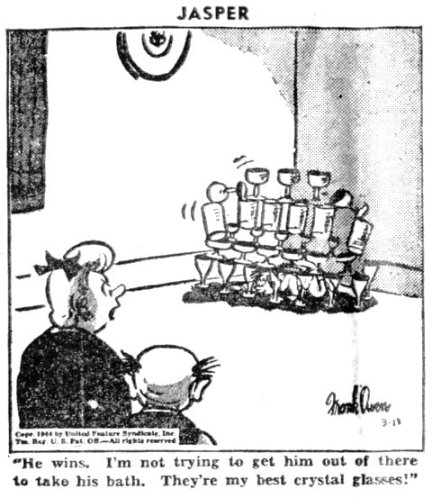
|

|
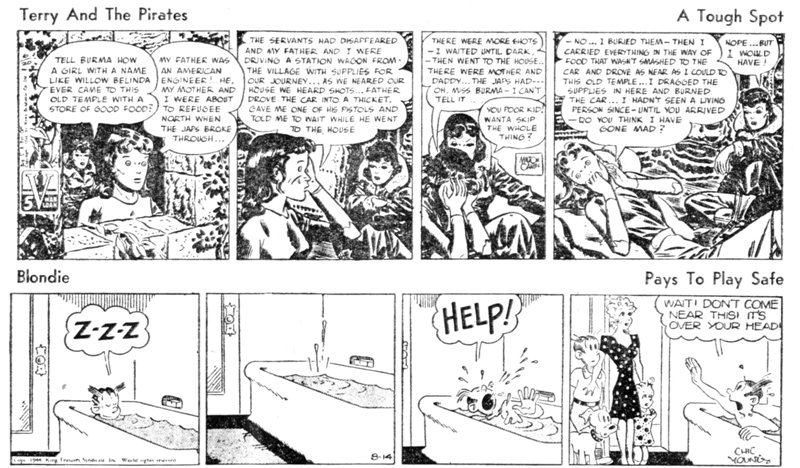
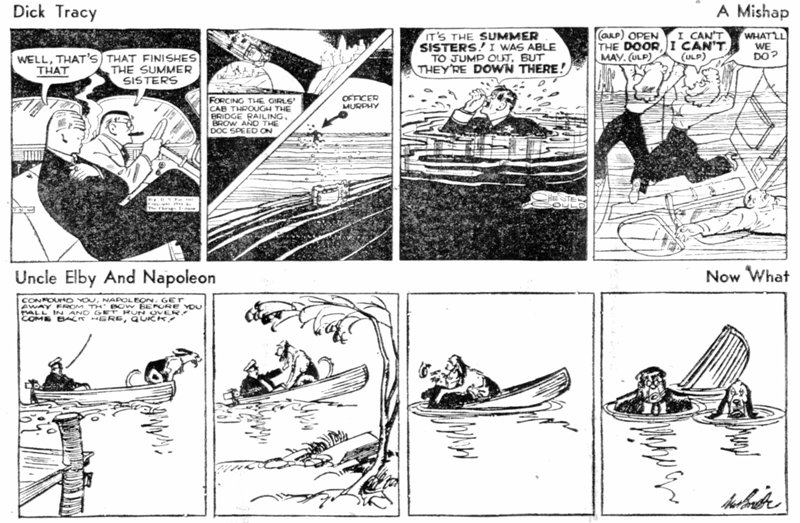
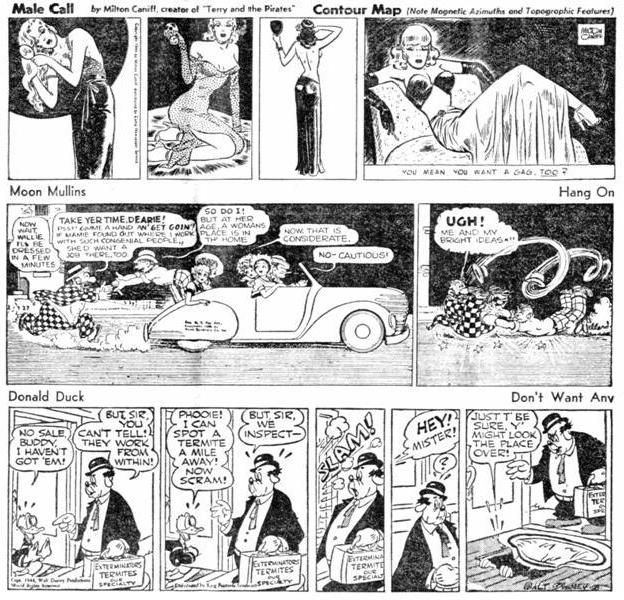


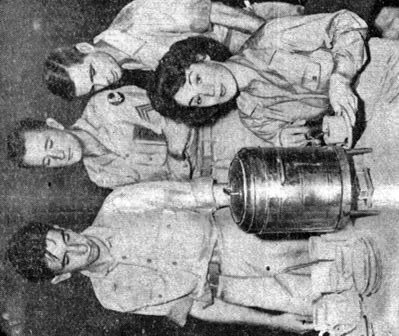 HOSTESS
HOSTESSCorp. Rushia Jean, Cordova, Ala., stationed with the Air WACs near Commandtown, adds the feminine touch to the Sunday coffee hour at the "Swelter Shelter," the ARC club at USAAF, Eastern Air Command Headquarters. |
 NERVE CENTER
NERVE CENTERhelping to install a new huge switchboard at Base Headquarters building are two members of a local Signal Corps unit, Sgt. P. N. Wagner, Atlantic City, N.J. (left) and S/Sgt. J. J. Swuik, of Fulton, N.Y. (right). |
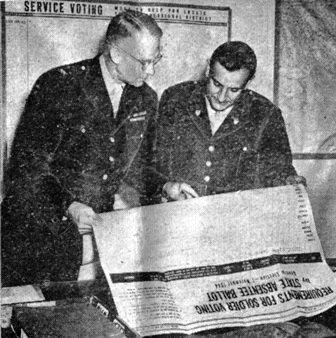 BALLOTS AND BULLETS
BALLOTS AND BULLETSTwo American officers, Col. J. W. Whitney (left) and Major T. A. Christophie, study the soldier's ballot instruction sheet at Allied Headquarters in the Southwest Pacific. Though at war for the third time during a Presidential election, ballots will be available to all American troops. |
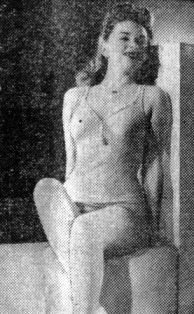 EYE FILLER
EYE FILLERBonnie Williams adds beauty and song to "You All Time Hit Parade" where she's heard with Tommy Dorsey's orchestra over Station VU2ZU every Saturday at 9:30. |
 CBI BROADCASTERS
CBI BROADCASTERSLt. Col. Paul L. Jones, right, asks the questions and Sgt. P. J. Hall supplies the answers which were transcribed for a radio program to be broadcast over a nationwide U.S. network, telling the folks back home about the recent record unloading by a Calcutta Port Battalion. |
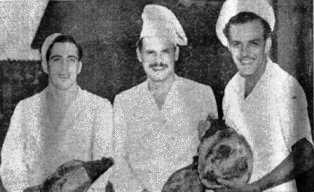 HAM FOR GIs
HAM FOR GIsProudly displaying the first shipment of fresh smoked hams to be deleivered to CBI troops are, left to right, Corp. Manuel Fernandez, of Detroit, Michigan; Pvt. Anton Nowaczynski, of Canton, Ohio; and Sgt. Anton Bukauskas, of Chicago, Ill. The ham was raised in India by the Depot Veterinarian section of General Depot No. 2. |
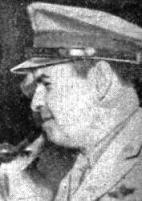 NEW B-29 BOSS
NEW B-29 BOSSMaj. Gen. Curtis E. LeMay, recently appointed commanding general of the XX Bomber Command, succeeding Brig. Gen. Kenneth Wolfe. |
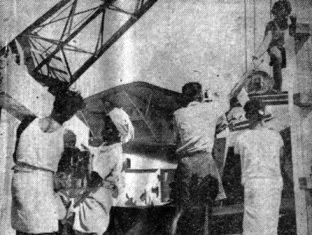 CRATE PICTURE
CRATE PICTUREIndian workers uncrate a U.S. Corsair fighter plane for assembly at a base of the British Fleet Air Arm in Ceylon. Lord Wavell, Viceroy of India, has termed the assistance of India, both in troops and material, a vital factor in Allied success in the Middle East. |
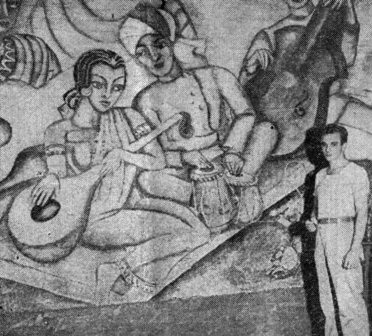 GI MURALIST
GI MURALISTS/Sgt. John H. Garrison, Marion, Ill., stands besides a mural depicting an Indian folk dance which he painted during off-duty hours on the brick wall inside an American Red Cross recreation center at an advanced bomber base in India. The mural is 13 feet square and framed with bamboo. |
 VU2ZU STAFF MEETING
VU2ZU STAFF MEETINGPvt. Michael Switzer, Trenton, N.J. (left) and Sgt. Jack Rollins, New York City (center) listen as Station Director VanMitchell, Wilkes Barre, Pa. (right) outlines the policy and suggested improvements in programs for the Armed Forces Radio Station VU2ZU. |
THE COMMAND POST. Published weekly by the Headquarters of Base Section 2 for military personnel only. Lt. Lester H. Geiss, Director, S/Sgt. Harry Purcell, Editor; S/Sgt. Jesse Sincere, circulation; Sgt. Maurice Pernod, news; Sgt. Bernard Cohen, drama; Pvt. Adolph A. Reibel, reporter. Printed at the "Patrika Press"

SEPTEMBER 8, 1944
Original issue of THE COMMAND POST shared by Linda James
Copyright © 2009 Carl Warren Weidenburner
TOP OF PAGE PRINT THIS PAGE ABOUT THIS PAGE
E-MAIL YOUR COMMENTS CLOSE THIS WINDOW
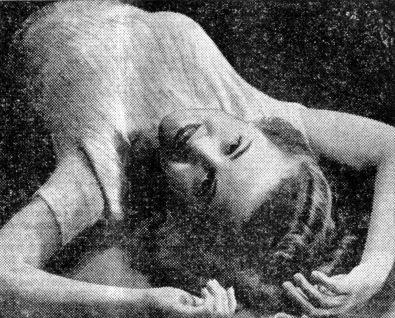 LOOKING AT YOU
LOOKING AT YOU
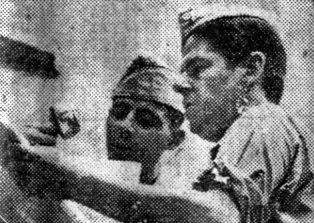 Lt. Finis Farr, right, and Lt. Joseph Paladino, transcribe the record ship unloading for airing over the Blue Network.
Lt. Finis Farr, right, and Lt. Joseph Paladino, transcribe the record ship unloading for airing over the Blue Network.
